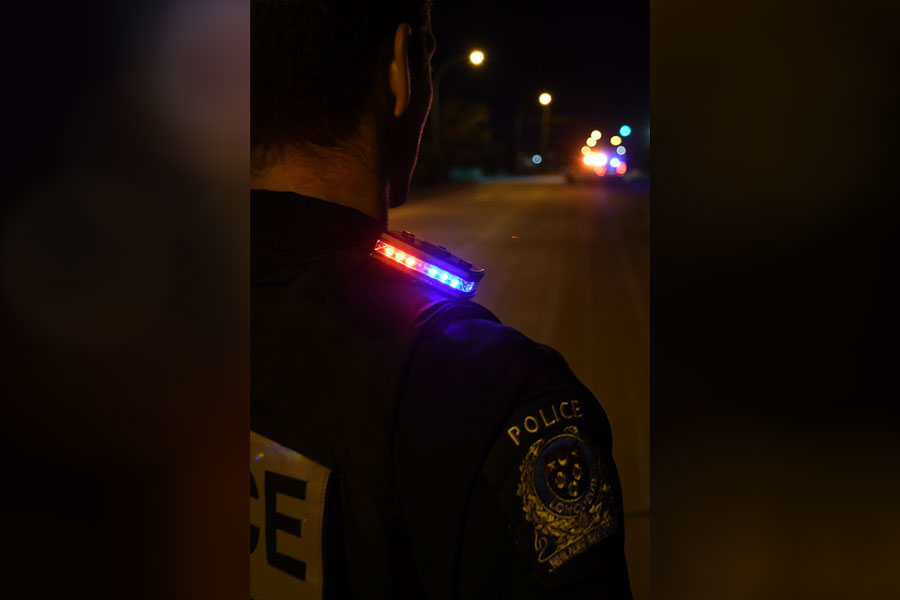Law enforcement chaplains provide bright gift to Idaho Falls police officers
Published at | Updated at
IDAHO FALLS – A local nonprofit provided law enforcement with a gift worth $3,000 last week.
After a year of fundraising, the Law Enforcement Chaplaincy of Idaho donated 30 safety lights to the Idaho Falls Police Department for officers to wear on their shoulders while they are on duty during nighttime hours.
“We’re very grateful to the chaplains. They do a lot for the community and for the police department. The lights are a piece of safety gear, so we were very grateful to get those and issue them to our officers as quick as we could,” Police Chief Bryce Johnson tells EastIdahoNews.com.
The Law Enforcement Chaplaincy of Idaho is a nonprofit volunteer chaplaincy training program created by Idaho Falls Pastor Tim Rupp and Christa Trinchera. It was launched last year to support law enforcement and victims during tough situations.
RELATED | Local pastor looking to raise $20,000 to provide safety lights for law enforcement
The group began raising funds for the lights about a year ago in response to the death of Bonneville County Deputy Wyatt Maser, who was killed by a fellow deputy responding to help him on the scene of a rollover crash on May 18, 2020. The responding deputy didn’t see Maser in the darkness.
Though the lights only went to IFPD, Trinchera says the original plan was to provide safety lights for the Bonneville County Sheriff’s Office as well.
“By the time we closed the fundraiser, every deputy already had a guardian angel light,” says Trinchera. “The sheriff’s office purchases them as part of equipment, so they already had them. That’s why we donated all 30 to the Idaho Falls Police Department.”
Johnson says it will be a huge benefit for officers, who will use these lights at their discretion.
“In some situations, the officers won’t want to use them because they don’t always want people to know where they’re at. But in other situations, especially on roadways where it’s dark and cars are coming and it’s dangerous to be on the road, they can turn these lights on, and it will help people know where the police officer is,” says Johnson.
RELATED | Graduates of volunteer chaplaincy program prepare to serve community
Since the creation of the Chaplaincy program, 30 active chaplains have responded to calls with officers 24 hours a day, seven days a week. The primary role of these chaplains is to provide comfort and support to victims of a crime or family members who have lost a loved one.
“Whenever officers respond to a scene where someone has died, they call a chaplain to provide comfort and support to that family and to make sure that family has access to resources … for grief counseling, shelter, food, clothing, etc,” Trinchera says. “We call ourselves compassionate problem-solvers because we try and just figure out a solution to whatever problem may arise.”
There are also chaplains who are trained to help officers in the aftermath of a response to a traumatic event. In either case, the chaplains aren’t there to preach or proselyte. Their only job is to help where needed.
“One mark of a chaplain is to be open to all faiths,” says Nancy Amos, a law enforcement chaplain who is also the pastor at St. Paul’s United Methodist Church in Idaho Falls. “If somebody asks questions about Christianity or different faiths, we can certainly speak to that … but we don’t proselytize while we are in our chaplain’s uniform.”
Amos worked as a firefighter chaplain in Zanesville, Ohio, for five years prior to moving to Idaho Falls. She joined the program because she missed working with first responders.
“Being able to help people through some of their hardest times in life is very rewarding to me,” Amos says.
Since its inception, Johnson says the chaplaincy program has proven to be a valuable resource for the department that “has filled … needs beyond our expectations.”
Johnson recalls a particularly difficult call where a chaplain’s response was meaningful to him.
“The next day, the chaplain called me up just to talk and ask me how I was doing. He followed up with me about a week later just to say hi. Nothing formal, they just wanted me to know that someone was thinking about me and that they cared, that I was in their prayers and if I needed anything, I could reach out,” Johnson says. “For me … that was impactful.”
The things officers deal with on a daily basis are far more difficult, Johnson says, and having that resource available to them is beneficial.
During the month of July, Trinchera says the chaplains put in 125 hours of service to the community and the need for them continues to grow.
This fall, they’re planning to provide advanced training for chaplains interested in helping firefighters. Another chaplain academy is also slated to get underway around the same time.
To learn more, visit the website.



